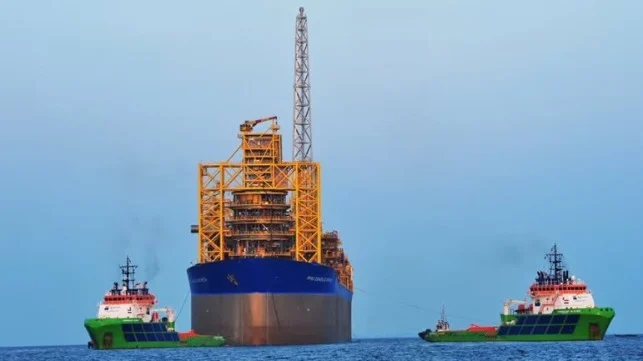
Image credit: The Maritime Executive.
Last year, oil surpassed soy as Brazil’s top export for the first time since 2012. According to government trade data, foreign oil sales reached nearly USD 45 billion in 2024, outpacing soy’s USD 43 billion. Over the past five years, the value of Brazil’s crude oil exports has more than doubled, and in the last decade, it has nearly quadrupled.
This surge in demand is driven by China. Data from Brazil’s government shows China took 44% of Brazil’s crude oil exports in 2024, followed by the US (13%) and Spain (11%). Over the past decade, exports to China have grown nearly fivefold.
In terms of volume, China remains a key player, though less dominant. In 2024, it purchased 44% of Brazil’s oil. While China’s demand tripled over the last decade, it mirrors consumption levels from five years ago.
Experts suggest that this trend could become more pronounced in the near future, partly due to the trade war between the US and China initiated by former President Donald Trump. In February, China imposed a 10% tariff on US oil, which made up 2% of its imports in 2024. This could lead China to rely more on suppliers like Brazil.
Brazil’s expanding oil exports are creating tensions with its climate goals and environmental commitments, especially as the country prepares to host the COP30 climate summit in Belém this November. President Luiz Inácio Lula da Silva recently said Brazil is leading a global push for higher climate ambition. However, in recent weeks, the government has been pushing for more oil exploration in ecologically sensitive areas, such as Foz do Amazonas, the mouth of the Amazon River.
This reliance on fossil fuels is raising doubts about Brazil’s green commitments.
Brazil’s Reliability to China
China is the world’s largest oil importer. According to the International Energy Agency, this demand has grown due to China’s investments in infrastructure, industry, and its expanding population. In 2023, Russia and Saudi Arabia were the main suppliers, with Brazil ranking sixth.
“Brazil is a reliable partner for China,” says Tulio Cariello, director of the Brazil-China Business Council (CEBC). “It’s a major oil producer, with strong research and development capabilities, and enjoys geopolitical stability due to its location.”
Brazil’s refined fuel exports to China have also surged, from USD 88 million to USD 609 million between 2023 and 2024. Igor Celeste, a market intelligence manager at ApexBrasil, believes this product could see further growth in the future.
André Leão, a researcher at Ineep, says the intensifying US-China rivalry could encourage Brazil to boost its oil exports to China.
“Brazil may seek to distance itself from the US, creating an opportunity to strengthen ties with China,” Leão explains.
While China remains a major oil consumer, it is also advancing its transition to cleaner energy. National CO2 emissions are expected to peak later this year, and Sinopec estimates that refining will peak by 2027 as domestic demand for diesel and gasoline declines.
Despite these efforts, analysts expect Brazil’s oil exports to China to continue growing. Cariello emphasizes that Brazil’s oil supply will remain crucial for China in the foreseeable future.
Financing the Energy Transition
Brazil faces a balancing act, as it is both an oil exporter and a climate leader. Analysts suggest that Brazil can reconcile these roles by maintaining its stance on “common but differentiated responsibilities,” a principle that acknowledges developing countries should reduce emissions but not at the same rate as developed nations.
“Oil revenues can help fund the energy transition,” says Leão.
In 2024, the Energy Research Company (EPE) released a study highlighting the oil sector’s role in energy security and investment. It argued that oil remains crucial for Brazil’s economic development and job creation, especially as the transition to cleaner energy unfolds.
“Even in the most ambitious transition scenarios, we haven’t reached zero oil consumption,” says Heloísa Borges Esteves, EPE’s director of oil studies. “The oil industry must support the transition by financing new technologies.”
Researchers acknowledge Brazil’s dependence on oil, particularly in transportation, but criticize the lack of clear mechanisms linking oil revenues to clean energy investments or monitoring these funds.
Shigueo Watanabe Jr., a researcher at Climainfo, emphasizes the need for transparency in how oil revenues are spent. “Without clear metrics and designated funds for clean energy, the idea of financing the energy transition remains a fantasy.”
The Future of Oil
The debate over oil exploration in Brazil has heated up, particularly regarding Foz do Amazonas. Petrobras wants to move forward with studies, arguing that the area is vital for maintaining Brazil’s oil reserves. However, the environmental agency Ibama opposes the project due to potential harm to mangroves and Amazonian reefs.
President Lula has strongly supported the exploration, and the government is considering replacing Ibama’s leadership if it rejects the project again.
Amid this conflict, observers are concerned about the lack of concrete plans to reduce Brazil’s reliance on fossil fuels. Watanabe Jr. argues that unless there is a significant shift in policy, Brazil will continue to exploit oil. However, he stresses that the government needs a clear plan to eventually reduce oil consumption.
“Brazil produces around three million barrels of oil a day, consuming one to two million, and exporting the rest. This contradiction between promoting climate action and increasing oil exports is unsustainable,” says Watanabe Jr.
Brazil’s energy plan through 2050 does not provide clear carbon-neutral scenarios. The government’s Climate Plan, which aims to mitigate climate change by 2035, is still in development, with the first part expected this year. Until then, Brazil lacks a definitive plan to reduce its dependence on oil.
